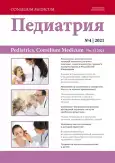Анализ нутритивного статуса у недоношенных новорожденных детей на различных видах вскармливания
- Авторы: Овчинникова Т.В.1,2, Таранушенко Т.Е.1, Салмина А.Б.1,3, Карпова Л.Н.1,2, Анциферова Е.В.1,2
-
Учреждения:
- ФГБОУ ВО «Красноярский государственный медицинский университет им. проф. В.Ф. Войно-Ясенецкого» Минздрава России
- КГБУЗ «Красноярский краевой клинический центр охраны материнства и детства»
- ФГБНУ «Научный центр неврологии»
- Выпуск: № 4 (2021)
- Страницы: 323-329
- Раздел: Статьи
- URL: https://bakhtiniada.ru/2658-6630/article/view/100630
- DOI: https://doi.org/10.26442/26586630.2021.4.201338
- ID: 100630
Цитировать
Полный текст
Аннотация
Выхаживание новорожденных, родившихся раньше срока, является сложной задачей современной перинатологии. Одним из основных факторов, определяющих нормальный рост и развитие новорожденных (особенно недоношенных), является полноценное вскармливание. Оценка адекватности питания включает данные антропометрии в динамике, анализ переносимости питания и, по показаниям, проведение комплекса лабораторных исследований, из которых наиболее важными являются клинические лабораторные результаты (гемоглобин и традиционные параметры оценки эритроцита) и биохимические параметры, характеризующие белковый обмен (включая непрямой метод оценки висцеральных запасов белка по уровню мочевины), обеспеченность железом, витаминный статус и т.д. В современной научной литературе данные по пищевому статусу недоношенных детей в периоде новорожденности на разных видах вскармливания очень малочисленны, разноречивы, что определяет необходимость продолжения исследований по данной проблеме.
Цель. Изучить показатели нутритивного статуса (гемоглобин, общий белок, альбумин, креатинин, мочевина, глюкоза в плазме крови) при рождении, в динамике на 10, 20, 30-е сутки жизни у недоношенных новорожденных с очень низкой (ОНМТ) и низкой массой тела (НМТ) при рождении на различных видах вскармливания (грудное молоко – ГМ, ГМ в комбинации с фортификатором и искусственное вскармливание – ИВ) для оценки проводимых мероприятий по успешному вскармливанию и качеству выхаживания.
Материалы и методы. Проведено обследование 118 детей в возрасте от рождения до 1 мес жизни в отделении патологии новорожденных и недоношенных детей Краевого перинатального центра охраны материнства и детства г. Красноярска. В 1-ю группу вошли 50 детей с ОНМТ при рождении, из нее выделены 3 подгруппы в зависимости от вида вскармливания: на грудном вскармливании (ГВ) – 17 детей, на «обогащенном» ГМ (ГВ + фортификатор) – 17 детей, на ИВ – 16 детей; во 2-ю группу включены 68 детей с НМТ при рождении, из них на ГВ – 36 детей, на ГВ + фортификатор – 12 детей, на ИВ – 20 детей.
Результаты. Оценка нутритивного статуса детей с ОНМТ при ИВ установила особенности в виде развития ранней анемии недоношенных (10% случаев), высоких значений уровня общего белка у детей к окончанию периода наблюдения в сочетании с нарастанием мочевины на всех этапах наблюдения и повышением уровня креатинина на 20-й день жизни. В группе новорожденных с НМТ получены сопоставимые данные по частоте выявляемости ранней анемии недоношенных между подгруппами на различных видах вскармливания и более низкие уровни общего белка, альбумина и мочевины в подгруппе детей, получающих ГВ + фортификатор.
Полный текст
Открыть статью на сайте журналаОб авторах
Татьяна Витальевна Овчинникова
ФГБОУ ВО «Красноярский государственный медицинский университет им. проф. В.Ф. Войно-Ясенецкого» Минздрава России; КГБУЗ «Красноярский краевой клинический центр охраны материнства и детства»
Автор, ответственный за переписку.
Email: tane4ka092009@rambler.ru
ORCID iD: 0000-0002-9319-2894
аспирант каф. педиатрии, врач-неонатолог отд-ния патологии новорожденных и недоношенных детей
Россия, КрасноярскТатьяна Евгеньевна Таранушенко
ФГБОУ ВО «Красноярский государственный медицинский университет им. проф. В.Ф. Войно-Ясенецкого» Минздрава России
Email: tetar@rambler.ru
ORCID iD: 0000-0003-2500-8001
д-р мед. наук, проф., зав. каф. педиатрии
Россия, КрасноярскАлла Борисовна Салмина
ФГБОУ ВО «Красноярский государственный медицинский университет им. проф. В.Ф. Войно-Ясенецкого» Минздрава России; ФГБНУ «Научный центр неврологии»
Email: allasalmina@mail.ru
д-р мед. наук, проф., гл. науч. сотр. гл. науч. сотр. и зав. лаб. экспериментальной нейроцитологии отд. исследований мозга
Россия, Красноярск; МоскваЛюдмила Николаевна Карпова
ФГБОУ ВО «Красноярский государственный медицинский университет им. проф. В.Ф. Войно-Ясенецкого» Минздрава России; КГБУЗ «Красноярский краевой клинический центр охраны материнства и детства»
Email: tane4ka092009@rambler.ru
канд. мед. наук, ассистент каф. педиатрии, зав. отд-нием патологии новорожденных и недоношенных детей (II этап), гл. внештатный неонатолог Красноярского края
Россия, КрасноярскЕкатерина Владимировна Анциферова
ФГБОУ ВО «Красноярский государственный медицинский университет им. проф. В.Ф. Войно-Ясенецкого» Минздрава России; КГБУЗ «Красноярский краевой клинический центр охраны материнства и детства»
Email: Anciferova_ekate@mail.com
канд. мед. наук, доц. каф. педиатрии, врач-неонатолог отд-ния патологии новорожденных и недоношенных детей (II этап)
Россия, КрасноярскСписок литературы
- Roszkowska R, Taranta-Janusz K, Wasilewska A. The role of early-life metabolic programming in the pathogenesis of lifestyle diseases. Dev Period Med. 2014;18(4):477-82.
- Lapillonne A, Griffin IJ. Feeding preterm infants today for later metabolic and cardiovascular outcomes. J Pediatr. 2013;162(3 Suppl.):S7-16. doi: 10.1016/j.jpeds.2012.11.048
- Bagheri F, Nakhaee N, Jahani Y, Khajouei R. Assessing parents' awareness about children's "first thousand days of life": a descriptive and analytical study. Arch Public Health. 2021;79(1):154. doi: 10.1186/s13690-021-00673-6
- Nordman H, Jääskeläinen J, Voutilainen R. Birth Size as a Determinant of Cardiometabolic Risk Factors in Children. Horm Res Paediatr. 2020;93(3):144-53. doi: 10.1159/000509932
- Schneider N, Garcia-Rodenas CL. Early Nutritional Interventions for Brain and Cognitive Development in Preterm Infants: A Review of the Literature. Nutrients. 2017;9(3):187. doi: 10.3390/nu9030187
- Kim YJ, Shin SH, Lee ES, et al. Impact of size at birth and postnatal growth on metabolic and neurocognitive outcomes in prematurely born school-age children. Sci Rep. 2021;11(1):6836. doi: 10.1038/s41598-021-86292-1
- Ramel SE, Zhang L, Misra S, et al. Do anthropometric measures accurately reflect body composition in preterm infants? Pediatr Obes. 2017;12(Suppl. 1):72-7. doi: 10.1111/ijpo.12181
- Bradford J, Beck K, Nshimyiryo A, et al. Nutritional evaluation and growth of infants in a Rwandan neonatal follow-up clinic. Matern Child Nutr. 2020;16(4):e13026. doi: 10.1111/mcn.13026
- Программа оптимизации вскармливания детей первого года жизни в Российской Федерации. М., 2019 [Programma optimizatsii vskarmlivaniia detei pervogo goda zhizni v Rossiiskoi Federatsii. Moscow, 2019 (in Russian)].
- Pereira-da-Silva L, Virella D, Fusch C. Nutritional Assessment in Preterm Infants: A Practical Approach in the NICU. Nutrients. 2019;11(9):1999. doi: 10.3390/nu11091999
- Chmielewska A, Farooqi A, Domellöf M, Ohlund I. Lean Tissue Deficit in Preterm Infants Persists up to 4 Months of Age: Results from a Swedish Longitudinal Study. Neonatology. 2020;117(1):80-7. doi: 10.1159/000503292
Дополнительные файлы







